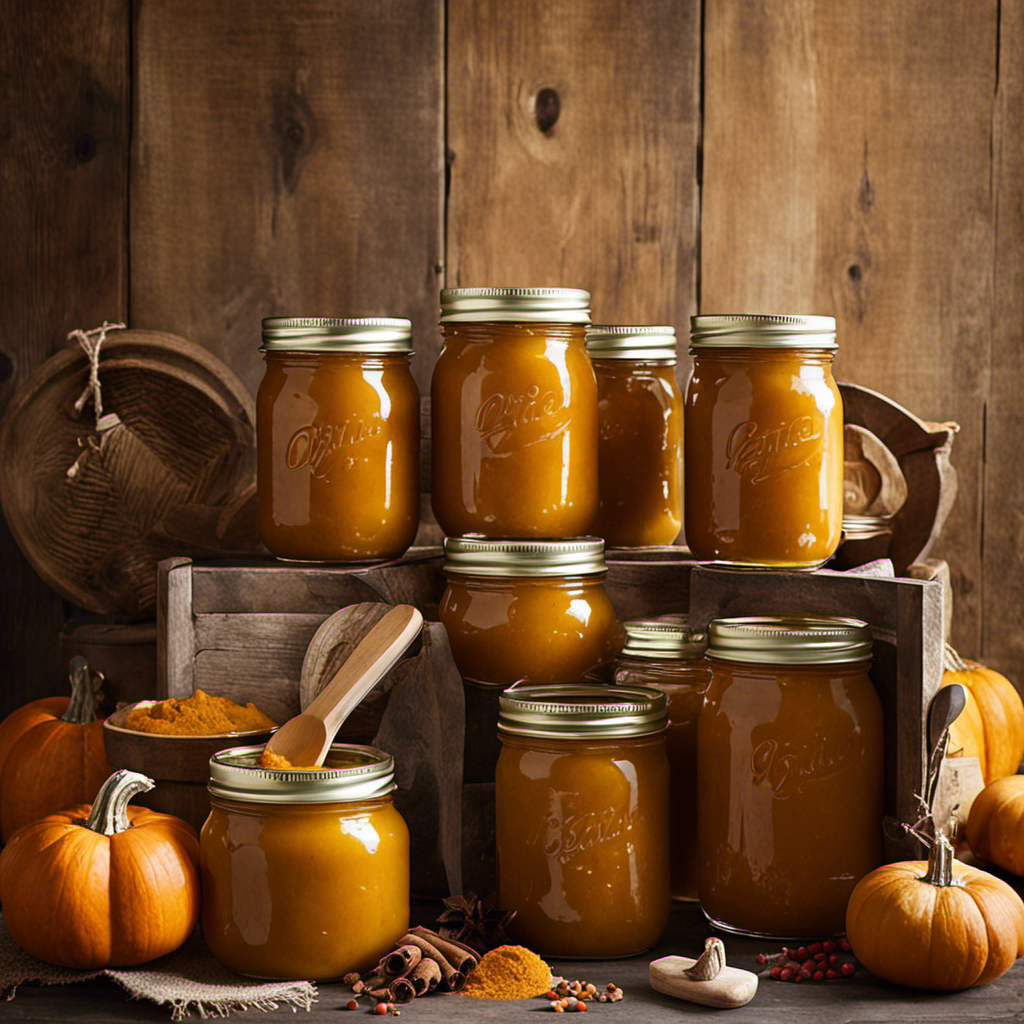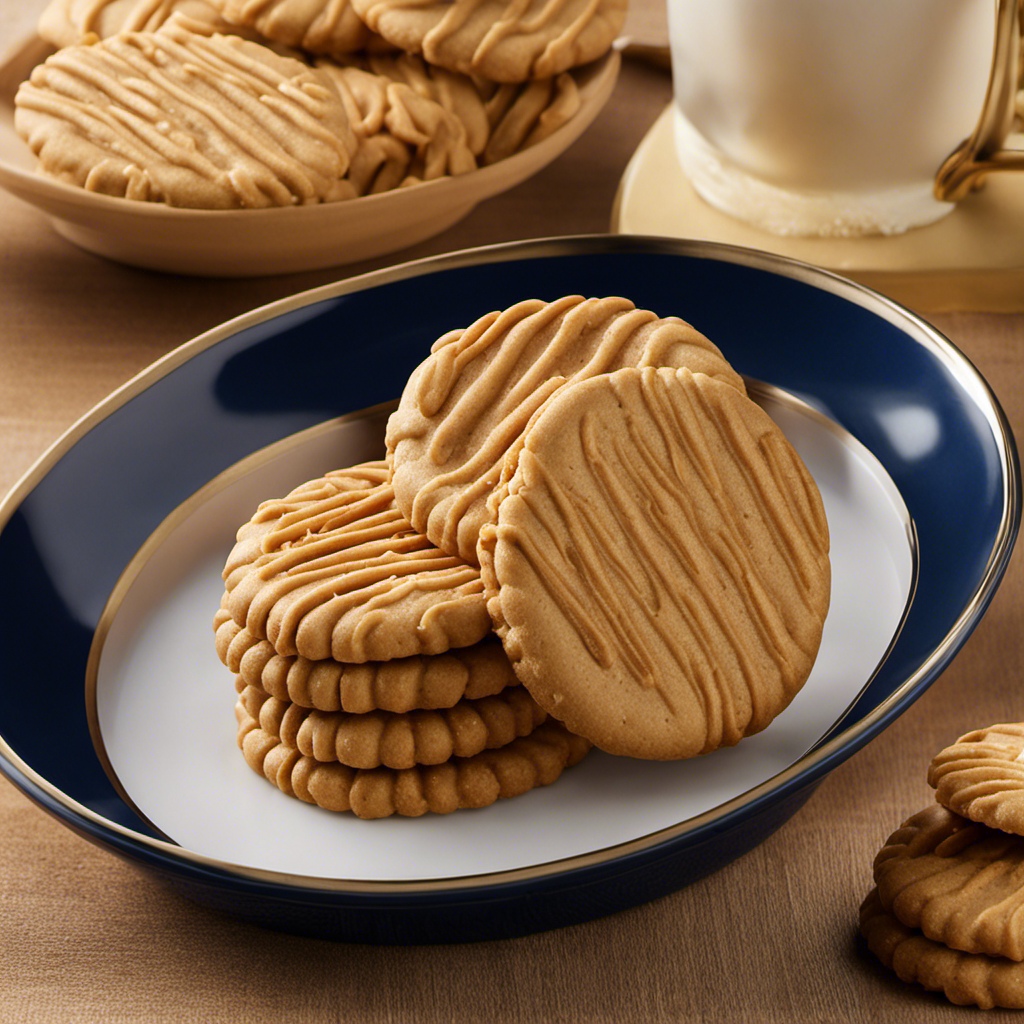Before indulging in spreading rich, homemade butter over a freshly baked slice of bread, I can’t help but wonder – what is the shelf life of homemade butter?
In this article, I will delve into the shelf life of homemade butter and explore the factors that affect its longevity. I will also provide tips on storing homemade butter properly and how to identify signs of spoilage.
So let’s dive in and ensure our butter stays fresh and delicious for as long as possible.
Key Takeaways
- Homemade butter typically lasts for 2-3 weeks in the refrigerator.
- Temperature affects butter spoilage, with cooler temperatures being ideal.
- Proper packaging, such as wrapping in wax paper or aluminum foil, helps extend shelf life.
- Using fresh, high-quality ingredients and airtight containers helps preserve the freshness of homemade butter.
Shelf Life of Homemade Butter
Homemade butter typically lasts for about 2-3 weeks in the refrigerator. There are several factors that can influence its spoilage.
One important factor is the temperature at which it is stored. Butter should always be kept at a cool temperature, ideally between 32 and 40 degrees Fahrenheit. Exposure to higher temperatures can cause the butter to spoil more quickly.
Another factor is the presence of contaminants, such as bacteria or mold. It is crucial to always use clean utensils and containers when handling and storing homemade butter to prevent the growth of harmful microorganisms.
Additionally, proper packaging can also extend the shelf life of homemade butter. It is recommended to wrap the butter tightly in wax paper or aluminum foil to protect it from air and light.
Factors Affecting the Longevity of Homemade Butter
When it comes to the longevity of homemade butter, there are several factors that can influence its shelf life.
Firstly, the storage temperature plays a crucial role in determining how long the butter will stay fresh.
Secondly, the quality of ingredients used in making the butter can greatly impact its longevity.
Lastly, the packaging and preservation methods employed are essential in ensuring that the butter stays fresh for as long as possible.
Storage Temperature’s Impact
Storing butter at warmer temperatures can significantly impact its shelf life. Temperature control is crucial for maintaining the freshness and quality of homemade butter.
To ensure optimal storage conditions, it is recommended to refrigerate butter at a temperature between 32-41°F (0-5°C). Refrigerators provide a controlled environment that slows down the growth of bacteria and prevents the butter from spoiling quickly.
When storing butter, it is important to keep it away from strong-smelling foods as it can easily absorb odors. Additionally, butter should be kept in an airtight container or wrapped tightly in foil or wax paper to prevent it from picking up any unwanted flavors.
Following these refrigeration tips will help extend the shelf life of homemade butter, allowing you to enjoy its rich flavor and creamy texture for longer.
Quality of Ingredients
To ensure the best flavor and texture, make sure you’re using fresh and high-quality ingredients for your butter. Here are four key tips for selecting the right ingredients to preserve the freshness of your homemade butter:
-
Choose high-quality cream: Start with fresh, pasteurized cream that has a high butterfat content. Look for cream from grass-fed cows for a richer flavor.
-
Avoid additives: Check the label and avoid cream that contains additives or stabilizers. These can affect the taste and texture of your butter.
-
Use unsalted butter: Using unsalted butter allows you to control the salt content in your homemade butter. It also ensures that you’re starting with pure butter, without any extra flavors.
-
Consider organic options: Organic cream is often produced without the use of synthetic pesticides or hormones. Choosing organic ingredients can contribute to a cleaner and more natural flavor in your homemade butter.
Packaging and Preservation Methods
Packaging and preservation methods help maintain the freshness and flavor of your homemade butter. When it comes to packaging techniques, using airtight containers is essential. I prefer using glass jars with tight-fitting lids to keep the butter protected from air and moisture. This helps to prevent oxidation and maintain its rich taste.
Another effective method is wrapping the butter in parchment or wax paper, followed by placing it in a resealable plastic bag. This double layer of protection helps to keep the butter fresh for longer periods.
Additionally, using homemade butter molds can add a touch of elegance to your packaging. These molds not only shape the butter into beautiful designs but also help in maintaining its freshness by providing a barrier against external elements.
Storing Homemade Butter Properly
If you want your homemade butter to last longer, make sure you store it properly. Here are some tips to help you keep your butter fresh and delicious for as long as possible:
-
Use a proper container: Store your homemade butter in an airtight container to prevent exposure to air and moisture. This will help maintain its flavor and texture.
-
Refrigeration temperature: Keep your butter in the refrigerator at a temperature between 32 and 40 degrees Fahrenheit (0 and 4 degrees Celsius). This will slow down the growth of bacteria and extend its shelf life.
-
Avoid storing near strong odors: Butter easily absorbs odors from other foods, so make sure to keep it away from strong-smelling items like onions or garlic.
-
Freeze for long-term storage: If you want to store your homemade butter for an extended period, consider freezing it. Wrap it tightly in wax paper or plastic wrap, then place it in a freezer bag or container.
Signs of Spoilage in Homemade Butter
Watch out for any changes in color, texture, or smell in your homemade butter as these are signs of spoilage. Preventing spoilage is crucial to ensure the quality and safety of your butter. One common sign of spoilage is rancidity, which occurs when the butter’s fats break down. This can result in a foul smell and a bitter taste. To help you identify signs of spoilage, here is a table outlining the key indicators:
| Signs of Spoilage | Description |
|---|---|
| Color Change | The butter may develop a yellow or brownish hue |
| Texture Change | The texture may become grainy or greasy |
| Smell Change | The butter may emit a sour or rancid odor |
If you notice any of these signs, it is best to discard the butter to avoid any potential health risks. It’s important to store your homemade butter properly and consume it within a reasonable timeframe to prevent spoilage.
Extending the Freshness of Homemade Butter
When it comes to extending the freshness of homemade butter, there are a few key points to keep in mind.
First, proper storage techniques are essential in maintaining the quality and taste of the butter. This includes storing it in an airtight container in the refrigerator and avoiding exposure to heat and light.
Secondly, adding preservatives effectively can help prolong the shelf life of homemade butter. This can be done by incorporating salt or vinegar into the butter during the making process.
Lastly, maximizing the shelf life of homemade butter can be achieved by using it within a reasonable timeframe and ensuring that it is stored in optimal conditions.
Proper Storage Techniques
Proper storage techniques can help extend the shelf life of homemade butter. Here are some tips to ensure your butter stays fresh for longer:
-
Freezing Butter: If you have a large batch of homemade butter, consider freezing it in smaller portions. Wrap each portion tightly in plastic wrap or place it in an airtight container before freezing. This way, you can thaw only what you need and keep the rest preserved.
-
Storing Butter at Room Temperature: Butter can be safely stored at room temperature for a short period, usually up to a week. To do this, use a butter dish with a lid or cover the butter with a clean cloth. Keep it away from direct sunlight and sources of heat.
-
Refrigerating Butter: For longer-term storage, refrigeration is the best option. Keep the butter in an airtight container or its original packaging to prevent it from absorbing odors from other foods.
-
Label and Date: To avoid confusion, always label and date your stored butter. This will help you keep track of its freshness.
By following these storage techniques, you can ensure that your homemade butter lasts longer and stays fresh.
Now, let’s move on to the next section about adding preservatives effectively.
Adding Preservatives Effectively
Now that we’ve discussed the proper storage techniques for homemade butter, let’s explore the option of adding preservatives effectively.
While some commercial butter products include preservatives to extend their shelf life, many people prefer preservative-free alternatives. Luckily, there are natural preservation techniques that can help keep your homemade butter fresh for longer.
One option is to incorporate salt into your butter recipe, as salt acts as a natural preservative. Another method is to use vinegar, which can help inhibit the growth of bacteria. Additionally, you can try adding herbs or spices like garlic or rosemary, which not only add flavor but also have antimicrobial properties.
By utilizing these preservative-free alternatives, you can ensure that your homemade butter stays fresh and flavorful for as long as possible.
Now, let’s move on to the next section where we will discuss maximizing shelf life.
Maximizing Shelf Life
To maximize the shelf life of your homemade butter, you can try incorporating natural preservatives like salt, vinegar, or herbs and spices with antimicrobial properties. These preservatives not only help prevent the growth of harmful bacteria but also enhance the flavor of your butter.
Here are four ways you can maximize the shelf life of your homemade butter:
-
Add a pinch of salt: Salt acts as a natural preservative and can help prevent bacterial growth in your butter.
-
Use vinegar: A small amount of vinegar can help prevent rancidity and extend the shelf life of your homemade butter.
-
Infuse with herbs and spices: Herbs and spices like garlic, rosemary, or thyme have antimicrobial properties that can help preserve your butter and add a delightful flavor.
-
Store in an airtight container: Keeping your homemade butter in an airtight container can prevent oxidation and maintain its freshness for longer.
Using Expired Homemade Butter Safely
If your homemade butter has expired, you can still use it safely in certain cooking and baking recipes. Repurposing expired butter in recipes that involve high heat or thorough cooking can be a great way to reduce food waste.
When using expired butter, it’s important to check for any signs of spoilage such as a rancid smell or mold growth. If the butter appears and smells normal, it can be used in recipes like cookies, cakes, or bread where the butter is mixed with other ingredients and cooked at high temperatures.
The heat will help kill any bacteria that may have developed in the expired butter, ensuring safe consumption. However, it is still recommended to use your judgment and exercise caution when using expired ingredients.
Frequently Asked Questions About Homemade Butter Storage
One common question people have is how they can safely store their homemade butter. As someone who loves making my own butter, I understand the importance of proper storage to maintain its freshness and flavor.
Here are some tips to help you store your homemade butter effectively:
-
Use an airtight container: Transfer your butter into a container with a tight lid to prevent air exposure and keep it fresh for longer.
-
Keep it refrigerated: Store your homemade butter in the refrigerator to maintain its texture and prevent spoilage. It can last for up to three weeks when refrigerated.
-
Freeze for long-term storage: If you want to store your homemade butter for an extended period, consider freezing it. It can stay fresh for up to six months in the freezer.
-
Label and date your butter: To keep track of its freshness, remember to label your container with the date you made the butter.
Frequently Asked Questions
Can I Freeze Homemade Butter to Extend Its Shelf Life?
Yes, I freeze homemade butter to extend its shelf life. Freezing butter is an effective alternative storage method. It helps maintain its freshness and prevents spoilage. Just make sure to wrap it tightly in freezer-safe packaging.
Can I Store Homemade Butter in the Refrigerator Without Covering It?
I store homemade butter in the refrigerator without covering it, and it stays fresh for up to two weeks. However, it’s best to cover it with wax paper or plastic wrap to prevent it from absorbing odors.
Is It Safe to Consume Homemade Butter That Has Been Left Out at Room Temperature for a Few Hours?
Leaving homemade butter out at room temperature for a few hours can be risky. It’s best to store it in the refrigerator, covered, to prevent bacterial growth and ensure its safety for consumption.
Can I Use Expired Homemade Butter in Baking or Cooking?
Expired homemade butter can still be used in baking or cooking. Its taste may be compromised, but it can add richness to dishes like pancakes or mashed potatoes. Just make sure to check for any mold or off smells before using.
Can I Store Homemade Butter in Plastic Containers Instead of Glass Jars?
Storing homemade butter in plastic containers has its pros and cons. While it may be more convenient, plastic can retain odors and affect the taste. Glass jars are recommended for proper storage.
Conclusion
In conclusion, homemade butter can last for about 1-2 weeks when stored properly in the refrigerator. Factors such as temperature, air exposure, and cleanliness of equipment can affect its longevity. To extend its freshness, make sure to store it in an airtight container and keep it away from strong odors. If you notice any signs of spoilage, such as mold or an off smell, it’s best to discard it.
For example, my friend Sarah once made homemade butter and stored it in a mason jar. She forgot to seal it properly, and after a week, it started to develop a sour smell, indicating spoilage.










